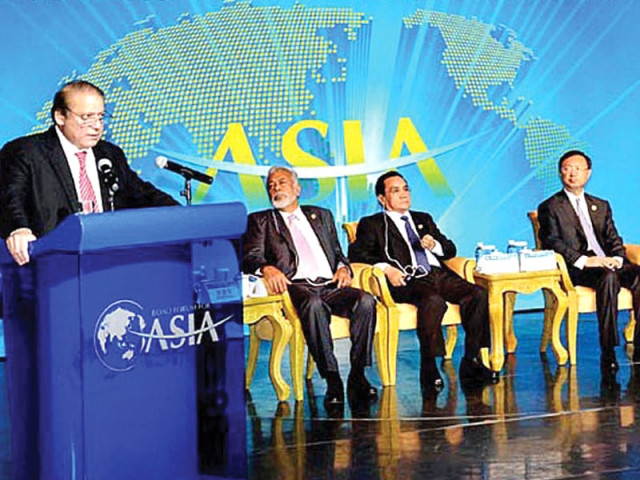A road full of potholes
Prime Minister Sharif has shown encouraging signs of making good on his image as an “economy first” leader.

Prime Minister Nawaz Sharif addresses a session on ‘Reviving the Silk Road — A dialogue with Asian Leaders’ at Boao Forum for Asia 2014. PHOTO: APP

First is Gwadar’s failure to launch. One doesn’t know where to start. The port city has long been heralded as the next big thing: a centre of geostrategic and economic importance that will drastically change the outlook of not only Balochistan, but the entire region itself. But it’s been a bit of a white elephant lately as confusion over operating rights (first Malaysia, which was controversially cancelled, and then China) and the lack of development continues to render the port useless. Though advertised rhetorically, and often visually, as a complete and finished product, work on the port has barely even begun despite the passage of over a decade at least. In fact, the Senate Standing Committee on Ports and Shipping was recently told that the initial cost of constructing the port, given some six years ago, was likely to rise over 1,000 per cent to over Rs100 billion. The absence of coordination between key stakeholders, irregularities, as well as mismanagement in the acquisition of land and machinery continue to dog the ailing project. In addition, the committee was also told that the Chinese government was reluctant to release funds prior to the provision of services as basic as electricity, communication and road links in the area.
And Gwadar is not the only issue. The road project that was supposed to run north from Pakistan’s coast and connect with the Karakoram Highway into China, far from starting, is still the subject of intense political debate even in the planning stage. Recently, senators from Balochistan voiced reservations over a proposal seeking a diversion of the route through Sindh and Punjab instead of Balochistan due to security concerns — and promised strong protests if this would happen. The debate over security and development in Balochistan is a political tinderbox — and this multi-billion dollar international project is under threat of being weighed down by it.
In fact, the “New Silk Road” extension/diversion is not the only proposal that has been caught up in domestic and regional politics. There is the Tukmenistan-Afghanistan-Pakistan-India pipeline project, which was part of Washington’s larger plans for the region, which was also, ironically enough, called “The New Silk Road”. This project has been subject to its own political ebb and flows — not least Washington’s own debilitating interest — and is as beleaguered as Gwadar. Then, who can forget the debacle-in-the-making that started off as the Iran-Pakistan-India gas pipeline, a project that has now become a huge embarrassment for Pakistan now that Iran has completed its side of the pipeline while Pakistan continues to dither as political and economic pressures — both real and perceived — assert themselves.
In short, there is much to suggest that Pakistan’s attempts to become a regional transit hub for any sort of project — even for one between two countries as friendly as China and Pakistan — will entail facing a lot of domestic and international challenges. Prime Minister Sharif has shown encouraging signs of making good on his image as an “economy first” leader who will continue to pursue regional cooperation. But let him be warned that this road — Silk or otherwise — is littered with political, economic, and historical potholes.
Published in The Express Tribune, April 12th, 2014.
Like Opinion & Editorial on Facebook, follow @ETOpEd on Twitter to receive all updates on all our daily pieces.














COMMENTS
Comments are moderated and generally will be posted if they are on-topic and not abusive.
For more information, please see our Comments FAQ